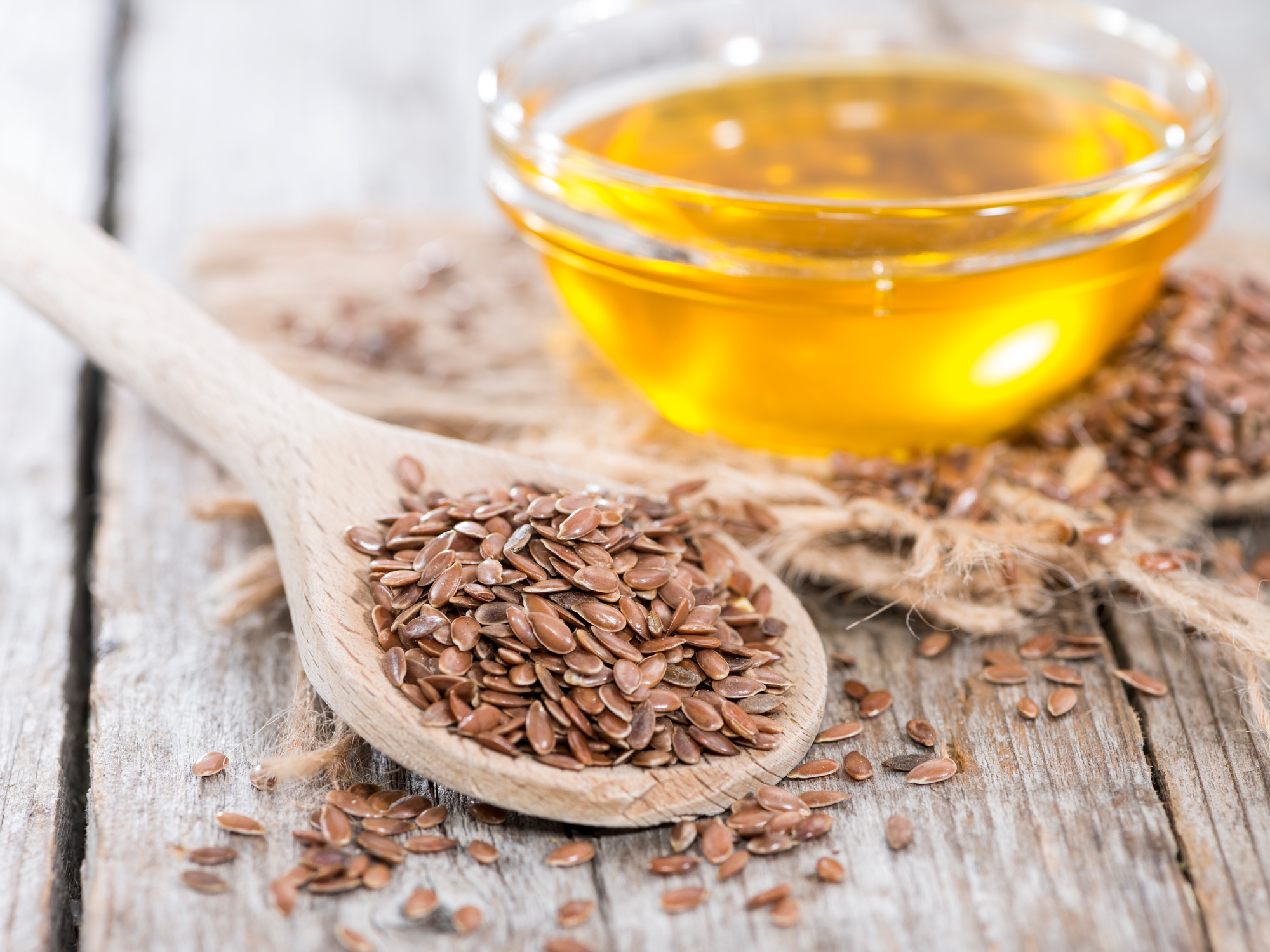Get Easy Health Digest™ in your inbox and don’t miss a thing when you subscribe today. Plus, get the free bonus report, Mother Nature’s Tips, Tricks and Remedies for Cholesterol, Blood Pressure & Blood Sugar as my way of saying welcome to the community!
10+ reasons to eat flaxseed daily

“Superfood” may be a modern term, but flaxseed, which very well may be the world’s first cultivated superfood, have been consumed for around 6,000 years. Flaxseeds, sometimes called linseeds, are small, brown, tan or golden-colored seeds, with big benefits…
Flaxseeds can help you:
- Improve digestion.
- Balance immune system — reverse and prevent breast, ovarian, prostate and colon cancer, and prevent melanoma.
- Lower bad cholesterol (as effective as statins, without the side-effects), and reduce risk for diabetes, stroke and heart attack. The soluble fiber content of flaxseed traps fat and cholesterol in the digestive system so that it is unable to be absorbed.
- Protect post-menopausal women from heart disease.
- Reduce sugar cravings, promote weight loss, reduce central obesity, avoid diabetes, and decrease insulin resistance.
- Reduce inflammation, arthritis and asthma.
- Balance hormones.
- Have clearer skin and healthier hair.
- Reduce dry eye syndrome.
- Lose weight — full of healthy fats and fiber, flaxseed helps you feel satisfied longer, so you will eat fewer calories overall leading to weight loss.
Tiny seed — big nutrition
When you look at the nutritional benefits of flaxseed, it’s clear why you should want to start adding these to your diet daily. A one-ounce (2 tbsp. ground) serving of flaxseed contains:
- Protein: 5g
- Fat: 12g — including omega-3essential fatty acids (alpha-linolenic acid) 6,388mg.
- Carbs: 8g — (Fiber 8g or 94% of Total Carbs).
- Vitamin B1: 31% DV — healthy nerves, heart, skin, hair, eyes, mouth, liver.
- Manganese: 35% DV — metabolizes cholesterol, carbohydrates, and protein; antioxidant; reduces osteoarthritis pain; bone health.
- Magnesium: 27% DV — heart health, relaxing, ability to fall asleep, supports thyroid.
- Phosphorus: 18% DV — healthy bones and teeth, major role in how your body uses carbohydrates and fats, repairs cells, stores energy, and works with B vitamins.
- Copper: 17% DV — balances with zinc to support immunity, sexual health, etc.
- Selenium: 10% DV — anti-oxidant, supports thyroid, anti-aging, metal detox, cardio and reproductive health, cancer prevention.
- Also, flaxseeds contain a good amount of vitamin B6, iron, potassium, copper and zinc.
High in fiber
Flax is also very high in soluble and insoluble fiber which can also improve digestive health, heart health, and decrease central obesity.
Flax contains high levels of mucilage gum content which is a gel-forming fiber that is water soluble and has incredible benefits on the intestinal tract, keeping the stomach from emptying too quickly, increasing fullness and nutrient absorption. The fiber increases colon detoxification, fat loss and reduces sugar cravings.
A good recommendation for fiber is a minimum of 50 grams per day — and, unfortunately, most Americans don’t get anywhere near that amountin their diets. Fiber is considered the number one anti-aging nutrient, a simple fix for avoiding diabetes, and one of the best nutrients to ward off superbugs and myriad diseases.
Highest plant source of omega-3s
Flax is the richest source of the plant-based omega-3 essential fatty acids, called alpha-linolenic acid (ALA) in the world. (Omega 6:3 ratio of 1:4 compared with chia at 1:3.03).
The ALA in flax can help protect the lining of the digestive tract and maintain GI health; help reverse skin conditions like acne, rosacea, and eczema.
ALA fats also help reduce inflammation, which in turn may facilitate weight loss. One study found that adding flaxseeds into your diet can naturally reduce bad cholesterol levels and increase fecal fat excretion.
Like chia seeds, flax has even more omega-3 ALA. The health benefits associated with ALA consumption include cardiovascular effects, neuro-protection, a counter to the inflammation response, and benefits against autoimmune disease.
The highest source of lignans
Flaxseed is ranked #1 as a source of lignans in human diets. Flaxseed contains about seven times as many lignans as the closest runner-up, sesame seeds.
Lignans are unique fiber-related polyphenols that provide us with antioxidant benefits for anti-aging, hormone balance and cellular health… which offer the following:
- Probiotics — polyphenols support the growth of probiotics in the gut and may also help eliminate bad bacteria and yeast from the body.
- Anti-viral and antibacterial properties — may help reduce the number or severity of colds and flu.
- Breast cancer reduction — a study discovered that lignans from flaxseeds may decrease the risk of breast cancer. The three lignans found in flaxseeds can be converted by intestinal bacteria into enterolactone and enterodiol which naturally balance hormones which may be the reason flaxseeds reduce the risk of breast cancer.
- Hormone-related cancer reduction — another study found that the lignans in flaxseeds may also reduce the risk of endometrial, ovarian, and other hormone-related cancers.
- Promotes fertility — while reducing the instances of peri-menopausal symptoms and many other reproductive health diseases.
- Used as an alternative to hormone replacement therapy because lignans do have estrogenic properties.
- Reduces the risk of osteoporosis.
- Maintains cycle regularity for menstruating women.
- Regulates estrogen levels in post-menopausal women.
Easy ways to enjoy flaxseed
Flaxseed has a light, nutty taste. According to the Mayo Clinic, most nutrition experts recommend ground over whole flaxseed because the ground form is easier to digest. Whole flaxseed may pass through your intestine undigested, which means you won’t get all the benefits. Here are some ways to add it to the foods you already eat and enjoy:
- Sprinkle flaxseed on your cold cereal or hot oatmeal at breakfast.
- Add a teaspoon of ground flaxseed to the mustard or mayonnaise that you spread on your sandwich at lunch.
- Sprinkle on salads or in soups.
- Mix a tablespoon of ground flaxseed into your yogurt.
- Add flaxseed to tomato sauces or to casseroles.
- Add flaxseed to meatballs or meatloaf.
- Mix a tablespoon in with yogurt and raw honey.
- Bake ground flaxseeds into muffins, cookies and breads.
- Add to homemade sprouted granola.
- Can be mixed with water and used as an egg substitute for recipes (1 tbsp. ground plus 3 tbsp. water).
- To enhance the flaxseed benefits for your hormones include 1 tbsp. of ground flax along with 1 tbsp. of flaxseed oil per day in your favorite foods.
Editor’s note: Did you know that when you take your body from acid to alkaline you can boost your energy, lose weight, soothe digestion, avoid illness and achieve wellness? Click here to discover The Alkaline Secret to Ultimate Vitality and revive your life today!
Sources:
-
http://nutritiondata.self.com/facts/nut-and-seed-products/3163/2
-
Das, A, and TA Hammad. “Efficacy of a Combination of FCHG49 Glucosamine Hydrochloride, TRH122 Low Molecular Weight Sodium Chondroitin Sulfate and Manganese Ascorbate in the Management of Knee Osteoarthritis.” Osteoarthritis and cartilage.8.5 (2000): 343–50. Web. 4 Nov. 2016.
-
http://nutritionandmetabolism.biomedcentral.com/articles/10.1186/1743-7075-9-8
-
http://lyush.ntyxc.servertrust.com/v/vspfiles/bps_pdfs/nanomega/04ALAoverlooked.pdf
-
https://www.ncbi.nlm.nih.gov/pubmed/23211303
-
http://clincancerres.aacrjournals.org/content/11/10/3828.short
-
https://www.ncbi.nlm.nih.gov/pubmed/12771342?dopt=Abstract













